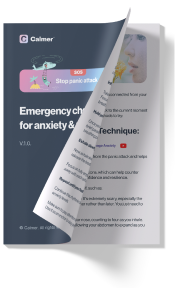Anxiety and panic attacks can be incredibly disruptive, leaving you feeling overwhelmed and out of control. However, there are effective strategies you can learn to manage these episodes and reclaim your peace of mind.

How to Stop Anxiety In the Moment
1. Diaphragmatic Breathing
This slow, deep breathing technique activates your body’s relaxation response. Breathe slowly through your nose for a count of 4, feeling your belly inflate. Hold for a count of 2, then exhale slowly through pursed lips for a count of 6, feeling your belly deflate. Repeat this cycle for several minutes.
2. Grounding Techniques
Grounding Techniques work by engaging your senses, which helps you focus on the present and break out of the thought spiral.
- 5-4-3-2-1 Technique
Name 5 things you see, 4 things you can touch, 3 things you can hear, 2 things you can smell, and 1 thing you can taste. - Focus on an Object
Observe an everyday object in detail, describing its color, shape, texture, etc., forcing your mind to stay present.
3. Progressive Muscle Relaxation
Progressive Muscle Relaxation technique involves tensing and relaxing different muscle groups, progressively working your way up or down your body. Tense each muscle group for 5 seconds, then relax completely for 10 seconds. Focus on the feeling of tension releasing with each exhale.
4. Cognitive Restructuring
During a panic attack, challenge unhelpful thoughts that fuel your fear. Ask yourself:
- Is this thought realistic? Are there alternative explanations for the situation?
- What is the evidence for and against this thought?
- How helpful is this thought? Would more positive and realistic thoughts be more helpful?
5. Visualization
Close your eyes and imagine yourself in a calming and peaceful place. Engage your senses: visualize what you see, hear, smell, feel, and taste in this safe space. This can help distract you from present anxieties and evoke feelings of relaxation.
Long-Term Anxiety Relief
1. Regular Exercise
Aim for at least 30 minutes of moderate-intensity exercise most days of the week. Walking, swimming, yoga, and dancing are all excellent options. Exercise releases endorphins, natural mood enhancers, and promotes relaxation.
2. Relaxation Techniques
Practice relaxation techniques like meditation and mindfulness to train your mind to focus on the present moment and let go of intrusive thoughts and worries. Apps like Headspace and Calm offer guided meditations for beginners.
3. Healthy Lifestyle
Getting enough sleep (7-8 hours for adults) is crucial for managing anxiety. Aim for a balanced diet rich in fruits, vegetables, and whole grains while limiting processed foods, sugary drinks, and excessive caffeine.
4. Therapy
A therapist can equip you with evidence-based strategies to manage anxiety and panic attacks. Cognitive Behavioral Therapy (CBT) is particularly effective at addressing negative thought patterns and developing coping skills.
5. Relaxation Apps & Resources
Several mobile apps and online resources offer guided meditations, breathing exercises, and educational materials on anxiety management. These can be valuable tools to supplement other strategies.
Seeking Professional Help
If your anxiety and panic attacks are severe, persistent, or significantly impacting your daily life, seeking professional help from a therapist or mental health professional is crucial. They can provide personalized treatment plans, including therapy and medication if needed, to help you manage your symptoms and improve your overall well-being.
Remember: You are not alone. Anxiety and panic attacks are common, but treatable. By implementing these actionable strategies and seeking professional help when needed, you can regain control and live a fulfilling life.
Additional Resources:
- National Institute of Mental Health: https://www.nimh.nih.gov/health/topics/anxiety-disorders
- Anxiety and Depression Association of America: https://adaa.org/
- Grounding Techniques: https://www.greyhavenwellness.com/mental-health-counseling-blog/grounding-techniques-getting-out-of-yourself




